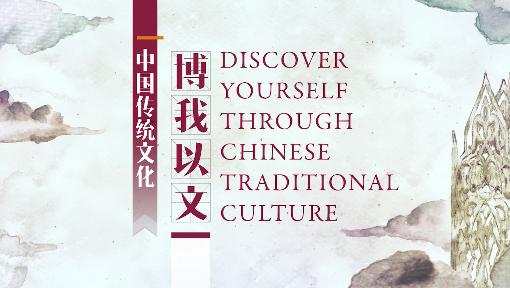课程简介
本课程旨在提高学习者的中国传统文化素养,通过学习国学经典文献双语作品,初步掌握中国儒、道之核心思想,培养鉴赏中国文化之“大美”的能力,从而传承古代文人精神,很好地融入人类文明世界。课程采用以英文(中英文字幕)授课为主,辅以中文深入讲解的授课方式,旨在领悟中国文化之精神的同时,引导青年人肩负起对外传播中国传统文化之重任。
中国文化博大精深,其 “向上之心强,相与之情厚”的文化精神体现在人伦之间的言语、礼貌、态度等日常行为中。中华文明更是“溥博如天,渊泉如渊”,作为世界历史上唯一不曾间断的文明形态,其哲学基础是什么?先哲们的哲学思维和宇宙观,价值观和世界观是什么?在中华文明复兴并走向世界的当代,我们应如何从中撷珍?从何处着手学习了解?如何讲述中国故事?如何将镌刻着“大气、大美、大和、大同”的壮丽文化绘卷向世界展现?
本课程以中英双语讲解,通过正篇学习、中外对话、经典诵读、交流探讨、经典文献双语阅读等环节,旨在带领大家从多重视角体悟中国传统文化,思考其在不同时代中,对于个人、社会以及世界的意义。帮助大家在品味经典的同时,在传统中寻找中国智慧、重新认识并发现自我,从哲学层面提升自身文化素养、唤起文化自觉并坚定文化自信。
本课程主要学习内容摘自《论语》、《大学》、《孟子》、《中庸》、《道德经》、《庄子》、《荀子》和《孙子兵法》等作品的重要章节。英文译本主要参考中国专家以及外国汉学家作品。
课程大纲
诚意正心 Sincerity in Mind and Correction of Heart
1.1 To understand the learning for “the adult or the great man” (大人之学)
1.2 To understand “three items” and “eight steps” (三纲八条目)
1.3 To understand the primacy of being sincere (诚之首要)
君子修身 Junzi and Self-cultivation
2.1 To understand the moral character of “Junzi” (君子之德)
2.2 To understand that self-cultivation is the premise of becoming a Junzi (君子之本—修身)
立志好学 Aspiration and Learning
3.1 Aspiration at a different level (志之浅深)
3.2 Finding joy in learning(学之乐趣)
3.3 Perseverance in learning(学之坚毅)
3.4 Learning and thinking(学思并行)
仁恕忠信 Humaneness, Reciprocity, Loyalty and Trustworthiness
4.1 To understand humaneness as the core value of Confucian philosophy(儒家思想核心价值—“仁”)
4.2 To understand righteousness, propriety, loyalty, trustworthiness as the means of expressing humaneness(“仁”之延伸—义、礼、忠、信)
4.3 To understand reciprocity as part of humaneness(恕道:己所不欲勿施于人)
孝悌敬惠Filial Piety, Fraternal Love, Reverence and Generosity
5.1 Filial piety and self-realization(孝与自我实现)
5.2 Family relationships (Father-son relationship) and the piety to ancestors(家族与祭祖)
5.3 Social functions of filial piety(孝之社会功能)
义利财富 Righteousness and Wealth
6.1 To understand righteousness as the means of expressing humaneness(行仁由义)
6.2 To understand the debate over righteousness and profit(义利之辨)
言礼交友 Ritual Propriety and Friendship
7.1 The rites and the service of divine beings(礼与祭神)
7.2 The rites and social order(礼与社会秩序)
7.3 The rites and personal nourishment(礼与自我实现)
治国爱民 Governance and Well-being
8.1 To understand the exemplary role of the ruler(领导垂范)
8.2 To understand what an ideal government should look like in Confucian philosophy(儒家良政)
圣人问道 The Sage and the Way
9.1 To understand the nature of Dao(道之本性)
9.2 To understand the ethical advice on virtue of inactivity (无为之德)
9.3 To understand the political ideal and the best way to run a state(治国理想)
茶中禅意 Zen Mind in Tea
10.1 The Origin of Tea(茶之本源)
10.2 The Variety of Tea(茶之品类)
10.3 The Tea Ceremony(茶之礼仪)
琴韵流光 Flowing Grace of Qin/Zither
11.1 The Magic Beauty of Qin(古琴之美)
11.2 The Daoism in Qin(古琴之道)
11.3 The Player or the Listener(古琴中人)
奇字妙书 Magic Character and Calligraphy
12.1 Four Treasures of the Study(文房四宝)
12.2 Five General Styles(书法基础)
12.3 Art of Chuan Ta (传拓艺术)
中西融汇 Revitalization of Tradition
13.1 Modern Chinese Intellectuals and Chinese Tradition(现代知识分子与中国传统)
13.2 Contribution on the Translation of Chinese Traditional Culture(知识分子的外译作品)
1.1 To understand the learning for “the adult or the great man” (大人之学)
1.2 To understand “three items” and “eight steps” (三纲八条目)
1.3 To understand the primacy of being sincere (诚之首要)
君子修身 Junzi and Self-cultivation
2.1 To understand the moral character of “Junzi” (君子之德)
2.2 To understand that self-cultivation is the premise of becoming a Junzi (君子之本—修身)
立志好学 Aspiration and Learning
3.1 Aspiration at a different level (志之浅深)
3.2 Finding joy in learning(学之乐趣)
3.3 Perseverance in learning(学之坚毅)
3.4 Learning and thinking(学思并行)
仁恕忠信 Humaneness, Reciprocity, Loyalty and Trustworthiness
4.1 To understand humaneness as the core value of Confucian philosophy(儒家思想核心价值—“仁”)
4.2 To understand righteousness, propriety, loyalty, trustworthiness as the means of expressing humaneness(“仁”之延伸—义、礼、忠、信)
4.3 To understand reciprocity as part of humaneness(恕道:己所不欲勿施于人)
孝悌敬惠Filial Piety, Fraternal Love, Reverence and Generosity
5.1 Filial piety and self-realization(孝与自我实现)
5.2 Family relationships (Father-son relationship) and the piety to ancestors(家族与祭祖)
5.3 Social functions of filial piety(孝之社会功能)
义利财富 Righteousness and Wealth
6.1 To understand righteousness as the means of expressing humaneness(行仁由义)
6.2 To understand the debate over righteousness and profit(义利之辨)
言礼交友 Ritual Propriety and Friendship
7.1 The rites and the service of divine beings(礼与祭神)
7.2 The rites and social order(礼与社会秩序)
7.3 The rites and personal nourishment(礼与自我实现)
治国爱民 Governance and Well-being
8.1 To understand the exemplary role of the ruler(领导垂范)
8.2 To understand what an ideal government should look like in Confucian philosophy(儒家良政)
圣人问道 The Sage and the Way
9.1 To understand the nature of Dao(道之本性)
9.2 To understand the ethical advice on virtue of inactivity (无为之德)
9.3 To understand the political ideal and the best way to run a state(治国理想)
茶中禅意 Zen Mind in Tea
10.1 The Origin of Tea(茶之本源)
10.2 The Variety of Tea(茶之品类)
10.3 The Tea Ceremony(茶之礼仪)
琴韵流光 Flowing Grace of Qin/Zither
11.1 The Magic Beauty of Qin(古琴之美)
11.2 The Daoism in Qin(古琴之道)
11.3 The Player or the Listener(古琴中人)
奇字妙书 Magic Character and Calligraphy
12.1 Four Treasures of the Study(文房四宝)
12.2 Five General Styles(书法基础)
12.3 Art of Chuan Ta (传拓艺术)
中西融汇 Revitalization of Tradition
13.1 Modern Chinese Intellectuals and Chinese Tradition(现代知识分子与中国传统)
13.2 Contribution on the Translation of Chinese Traditional Culture(知识分子的外译作品)
关
注
我
们


